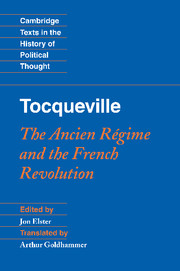Book contents
- Frontmatter
- Contents
- Introduction
- Bibliographical Note
- Chronology
- TOCQUEVILLE: THE ANCIEN RÉGIME AND THE FRENCH REVOLUTION
- Foreword
- Book I
- Book II
- Book III
- III.1 How, Toward the Middle of the Eighteenth Century, Men of Letters Became the Country's Leading Politicians, and the Effects That Followed from This
- III.2 How Irreligion Was Able to Become a General and Dominant Passion in Eighteenth-Century France, and How It Influenced the Character of the Revolution
- III.3 How the French Wanted Reforms Before They Wanted Liberties
- III.4 That the Reign of Louis XVI Was the Most Prosperous Era of the Old Monarchy, and How That Very Prosperity Hastened the Revolution
- III.5 How Attempts to Relieve the People Stirred Them to Revolt
- III.6 On Some Practices That Helped the Government Complete the People's Revolutionary Education
- III.7 How a Great Administrative Revolution Preceded the Political Revolution, and on the Consequences It Had
- III.8 How the Revolution Emerged Naturally from the Foregoing
- Appendix: On the Pays d'états, and in Particular Languedoc
- Notes
- Index
- CAMBRIDGE TEXTS IN THE HISTORY OF POLITICAL THOUGHT
III.7 - How a Great Administrative Revolution Preceded the Political Revolution, and on the Consequences It Had
Published online by Cambridge University Press: 05 June 2012
- Frontmatter
- Contents
- Introduction
- Bibliographical Note
- Chronology
- TOCQUEVILLE: THE ANCIEN RÉGIME AND THE FRENCH REVOLUTION
- Foreword
- Book I
- Book II
- Book III
- III.1 How, Toward the Middle of the Eighteenth Century, Men of Letters Became the Country's Leading Politicians, and the Effects That Followed from This
- III.2 How Irreligion Was Able to Become a General and Dominant Passion in Eighteenth-Century France, and How It Influenced the Character of the Revolution
- III.3 How the French Wanted Reforms Before They Wanted Liberties
- III.4 That the Reign of Louis XVI Was the Most Prosperous Era of the Old Monarchy, and How That Very Prosperity Hastened the Revolution
- III.5 How Attempts to Relieve the People Stirred Them to Revolt
- III.6 On Some Practices That Helped the Government Complete the People's Revolutionary Education
- III.7 How a Great Administrative Revolution Preceded the Political Revolution, and on the Consequences It Had
- III.8 How the Revolution Emerged Naturally from the Foregoing
- Appendix: On the Pays d'états, and in Particular Languedoc
- Notes
- Index
- CAMBRIDGE TEXTS IN THE HISTORY OF POLITICAL THOUGHT
Summary
Nothing had yet changed in the form of government, yet most of the secondary laws that govern the lives of individuals and the administration of affairs had already been abolished or amended.
The destruction of the guilds, followed by their partial and incomplete reinstatement, had profoundly altered all existing relations between worker and master. These were not only different but also uncertain and strained. The regulations governing Sunday work were abolished. State oversight was not yet firmly established, and the artisan, placed in a difficult and ambiguous position between the government and the employer, had no idea which of the two could protect him or was supposed to monitor him. The uncomfortable and anarchical state to which the entire urban lower class had been reduced in one fell swoop had immense consequences the moment the people began to return to the political scene.
A year before the Revolution, a royal edict turned the system of justice upside down. Several new jurisdictions were created, a host of others were abolished, and all jurisdictional regulations were changed. Now, in France, as I noted previously, the number of people involved either in judging or enforcing judicial decisions was immense. In truth, the entire bourgeoisie was directly or indirectly dependent on the courts. The immediate effect of the law was therefore to threaten the position and fortune of thousands of families, who suddenly found themselves on a new and more precarious footing.
- Type
- Chapter
- Information
- Tocqueville: The Ancien Régime and the French Revolution , pp. 170 - 178Publisher: Cambridge University PressPrint publication year: 2011



